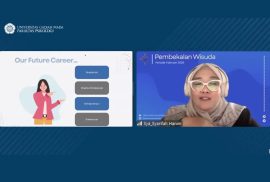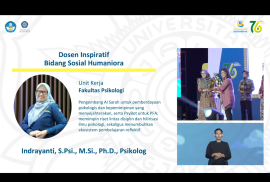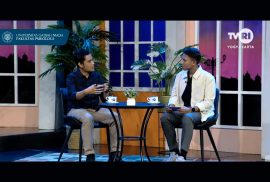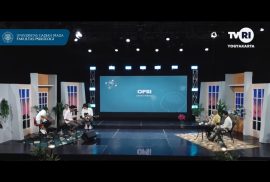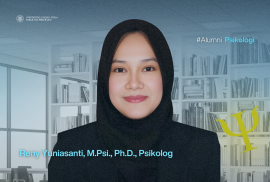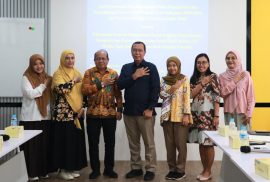The Faculty of Psychology at Universitas Gadjah Mada (UGM), through its Career Center, organized a Graduation Briefing for prospective undergraduate graduates of Period II Academic Year 2025/2026 on Monday (February 23), held online via Zoom Meeting. The event was attended by 59 undergraduate candidates, consisting of 52 regular program graduates and seven graduates from the International Undergraduate Program (IUP).
SDG 8: Decent Work and Economic Growth
Universitas Gadjah Mada has once again conferred the Anugerah Insan Berprestasi (Outstanding Person Award) to members of its academic community and alumni who have demonstrated exceptional contributions and performance to the university and to society at large. This year, the Faculty of Psychology UGM is proud to receive the Inspiring Lecturer in Social Sciences and Humanities award, which is presented to faculty member IIndrayanti, S.Psi., M.Si., Ph.D., Psikolog.
The Faculty of Psychology, Universitas Gadjah Mada, in collaboration with TVRI Yogyakarta, once again presents OPSI: Obrolan Psikologi (Psychology Talk) in its seventeenth episode, aired on Tuesday, 2 December 2025, from 15:00 to 16:00 WIB. This episode raises the theme “The Dilemma of Two Worlds: Work vs Family,” discussing the challenges faced by families in which both partners are working. The episode invites the public to understand the dynamics of roles and demands between the workplace and family life, as well as the importance of communication, fair division of roles, and emotional awareness in maintaining harmonious relationships.
The Center for Indigenous and Cultural Psychology (CICP) of the Faculty of Psychology, Universitas Gadjah Mada, participated in the u’GOOD Inaugural Conference titled “Thriving Together: Youth, Relational Wellbeing and the Future of the Global South,” held from October 7–9, 2025, in Dar es Salaam, Tanzania. This inaugural conference served as the official launch of u’GOOD research projects across 9 Global South countries and marked the initial meeting of a Community of Practice (CoP) aimed at strengthening cross-national and interdisciplinary collaborations.
The surge of online gambling practices in Indonesia, estimated to involve 1 percent of the population, with the majority in productive age groups, highlights the need for an accurate screening tool to detect gambling disorder and its impacts on mental health, social relationships, and work performance. Responding to this need, a multidisciplinary research team from the Faculty of Psychology, Universitas Gadjah Mada (UGM), in collaboration with the Karolinska Institute, Sweden, is adapting and validating the Gambling Disorder Identification Test (GDIT) into Indonesian. This initiative is expected to provide a valid and reliable screening instrument for researchers and practitioners in Indonesia.
The Faculty of Psychology at UGM has launched a study examining how organizational values are translated into effective strategies that enhance company performance. The study stems from the observation that many organizations fail not only due to market pressures, but because shared values are not consistently operationalized in decision-making. “Shared values” here refers to core principles agreed upon and embraced across the organization, from leadership to employees, as a compass for thinking and acting. Examples include integrity, professionalism, innovation, service, and collaboration. Led by Dr. Bagus Riyono, M.A., Psychologist, the research team will test empirical evidence that values must be embedded in strategy to make a tangible impact on performance.
A research team from the Faculty of Psychology, Universitas Gadjah Mada (UGM), will examine job flourishing, an indicator of positive mental health at work, among lecturers and administrative staff at a public university in Indonesia. This study responds to growing global concern about workers’ mental health. WHO data point to the high burden of depression, anxiety, and daily stress affecting productivity. In Indonesia, mental health indicators among working populations likewise call for more precise organizational-level mapping. The research focuses on how emotional, psychological, and social well-being at work relate to work engagement, performance, burnout, anxiety, and depression, while offering an evidence-based picture to inform intervention planning in campus settings.
The Faculty of Psychology, Universitas Gadjah Mada (UGM), in collaboration with TVRI Yogyakarta, once again presents OPSI: Obrolan Psikologi (Psychology Talk) with its fourteenth episode, airing on Tuesday, October 21, 2025, from 3:00–4:00 PM WIB. This episode raises the theme “In Step Together: Building Resilience in the Workplace,” which discusses ways to remain resilient in a work environment filled with demands and pressures.
Reny Yuniasanti, M.Psi., Ph.D., Psikolog, is known as an educator who firmly upholds integrity while actively contributing through professional organizations. Her academic journey began as one of the first cohort of the Master of Professional Psychology Program at Universitas Gadjah Mada (UGM) in 2005. She successfully completed her studies despite the fact that the program’s academic system was still in its trial phase.
The Faculty of Psychology, Universitas Gadjah Mada (UGM), has established a partnership with the Civil Service and Human Resource Development Agency (BKPSDM) of Balikpapan City. The signing of the cooperation agreement took place at the Faculty of Psychology UGM on Wednesday (September 24).

